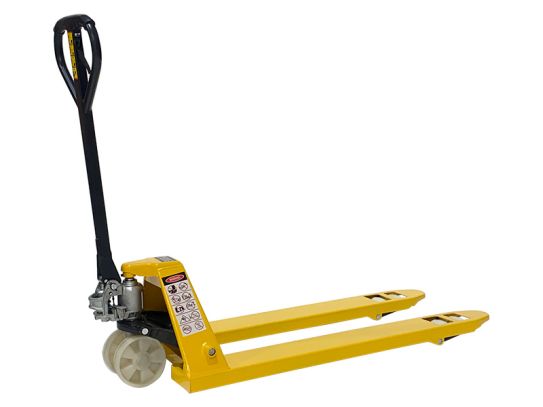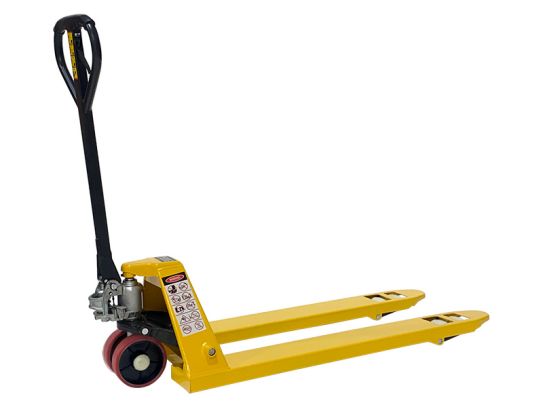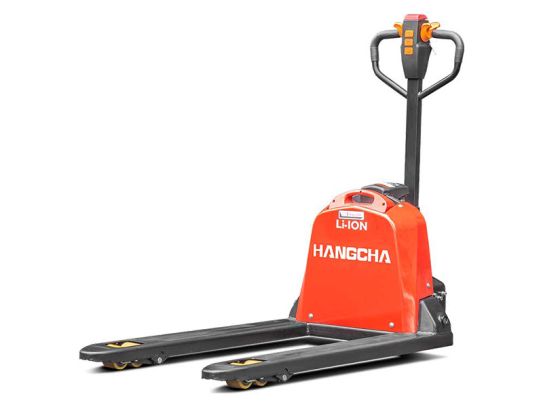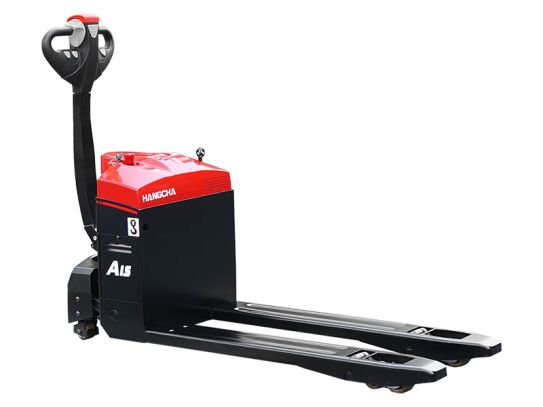Pallet Trucks
Transform Your Workspace with Our Reliable and Efficient Pallet Trucks
Are you tired of straining your back and struggling to move heavy pallets? Look no further! Our pallet trucks are the perfect solution for easily and efficiently moving pallets in your warehouse or business. With a sturdy and reliable design, these trucks are built to last. Plus, their sleek and compact size makes them easy to manoeuvre in tight spaces. Don't let heavy pallets weigh you down any longer.
Try our pallet trucks today and experience the convenience and ease of use for yourself. Order now and take the first step towards a more efficient and pain-free workspace.
What Are Pallet Trucks?
Pallet trucks are a type of material handling equipment that are used to move pallets. They typically consist of a platform with wheels that is used to support the pallet, some models utilise a hydraulic system to aid in raising and lowering the platform.
The operator can then use the pallet truck to move the pallet by pushing or pulling it. Pallet trucks are commonly used in warehouses, factories, and other settings where large quantities of goods are stored.
What Are the Benefits of Pallet Trucks
Pallet trucks are a convenient and efficient way to move heavy pallets in a warehouse or other business setting. Some benefits of using pallet trucks include:
- Improved ergonomics: Pallet trucks are designed to make it easier to move heavy pallets, which can help reduce strain on the back and other muscles.
- Increased productivity: Because pallet trucks make it easier to move heavy pallets, they can help workers be more efficient and get more done in less time.
- Improved safety: Pallet trucks can help prevent workplace injuries by allowing workers to move heavy pallets without straining or overexerting themselves.
- Cost savings: Using pallet trucks can help reduce the number of workers needed to move heavy pallets, which can save money on labour costs.
- Better organisation: Pallet trucks can help keep warehouses and other business environments more organised, which can improve overall efficiency.
How Do You Operate a Pallet Truck?
To operate a pallet truck, follow these steps:
- Make sure that the area where you will be using the pallet truck is clear and free of obstacles.
- Place the pallet truck in position next to the pallet you want to move.
- Position the forks of the pallet truck underneath the pallet, making sure they are evenly spaced and centred on the pallet.
- Use the handle of the pallet truck to raise the platform, lifting the pallet off the ground.
- Once the pallet is lifted, use the handle to steer the pallet truck in the desired direction.
- To lower the pallet onto a new surface, simply reverse the process. Use the handle to lower the platform until the pallet is resting on the ground.
It's important to remember that pallet trucks are heavy, powerful machines, and they should be operated with care to avoid accidents or injuries. Always make sure you are familiar with the specific model of pallet truck you are using, and follow the manufacturer's instructions for safe operation.
Are There Any Safety Issues with Pallet Trucks?
As with any type of machinery or equipment, there are potential safety issues to consider when using pallet trucks. Some common safety concerns include:
- Operator error: Pallet trucks should only be operated by trained and experienced individuals who are familiar with the proper safety procedures and techniques. Failing to follow proper safety procedures or using the truck improperly can increase the risk of accidents and injuries.
- Overloading: Pallet trucks have weight limits and should not be used to move pallets that exceed the maximum weight capacity. Overloading the truck can cause it to become unstable and increase the risk of accidents and injuries.
- Maintenance: Pallet trucks should be regularly maintained and inspected to ensure that they are in good working order. Failing to properly maintain the truck can increase the risk of accidents and injuries.
- Falling loads: Pallet trucks should be loaded and unloaded carefully to prevent the pallet from falling or shifting. Failing to secure the load properly can increase the risk of accidents and injuries.
Overall, it is important to follow proper safety procedures and use pallet trucks correctly to minimise the risk of accidents and injuries.
How Do I Maintain My Pallet Truck?
To maintain your pallet truck and ensure that it continues to operate safely and efficiently, it is important to follow a regular maintenance schedule. Some key maintenance tasks to consider include:
- Regularly inspect the truck for signs of wear and damage, including loose or damaged parts, worn wheels, and any other issues that may affect its performance.
- Clean the truck regularly to remove any dirt, debris, or other materials that may interfere with its operation.
- Lubricate moving parts, such as the wheels and lift mechanism, according to the manufacturer's instructions to ensure smooth and efficient operation.
- If your truck is hydraulic then check the fluid level and top off as needed to ensure that the lift mechanism is functioning properly.
- If your tires can be inflated then check and adjust the tire pressure as needed to ensure that the truck is stable and easy to manoeuvre.
- Regularly test the safety features, such as the emergency stop button and the overload protection, to ensure that they are functioning properly.
- In addition to these regular maintenance tasks, it is important to consult the manufacturer's instructions and follow any specific maintenance recommendations for your particular pallet truck model. Proper maintenance can help extend the life of your pallet truck and ensure that it continues to operate safely and efficiently.
What Are the Different Types of Pallet Trucks?
There are several different types of pallet trucks, each designed for specific purposes or applications. Here are a few examples:
- Manual pallet trucks: These are the most common type of pallet truck. They are operated manually, using a hydraulic system and a handle to raise and lower the platform.
- Electric pallet trucks: These pallet trucks are powered by an electric motor, which makes them easier to operate than manual pallet trucks. They are often used in environments where there is a lot of heavy lifting involved, such as warehouses and factories.
- Narrow aisle pallet trucks: As the name suggests, these pallet trucks are designed for use in narrow aisles where space is limited. They are typically smaller and more manoeuvrable than other types of pallet trucks.
- High lift pallet trucks: These pallet trucks are designed for lifting pallets to a higher height than other types of pallet trucks. They are commonly used in environments where pallets need to be lifted to a higher level, such as when loading or unloading goods onto a truck or shelf.
Do Different Types of Wheels Affect the Performance of Pallet Trucks?
Yes, the type of wheels on a pallet truck can affect its performance. Different types of wheels are designed for different purposes and can have different effects on the truck's handling, stability, and overall performance.
- Solid rubber wheels are durable and low-maintenance, but they may not provide as smooth a ride as other types of wheels.
- Pneumatic wheels, on the other hand, provide a smoother ride but may require more maintenance and can be prone to punctures.
- Polyurethane wheels offer a balance of durability and smoothness, but they may be more expensive than other types of wheels.
It is important to choose the right type of wheels for your specific needs and application. Some factors to consider when selecting wheels for a pallet truck include the type of surface the truck will be used on, the weight of the loads it will be carrying, and the overall performance requirements. Consulting with a knowledgeable sales representative or manufacturer can help you select the right wheels for your pallet truck.
Are There Any UK or European Industry Standards or Regulations That Apply to Pallet Trucks?
Yes, there are industry standards and regulations that apply to pallet trucks in the UK and Europe. These are designed to ensure the safety and proper operation of pallet trucks, and compliance with these standards is important for businesses that use the products regularly.
In the UK, the relevant industry standard is BS EN 1757-1: 2001, which covers the safety requirements for powered pallet trucks and other similar trucks. This standard specifies conditions for the design and construction of pallet trucks, including necessary safety features such as emergency stop buttons and overload protection.
In Europe, the relevant industry standard is EN 12999: 2003, which covers the safety requirements for manually propelled trucks, including pallet trucks. This also focuses on the safety precautions needed when making these products.
It is important for businesses that use pallet trucks in the UK and Europe to be aware of these standards and to ensure that their pallet trucks meet the relevant requirements. Compliance with these standards can help prevent accidents and injuries and ensure the safe and efficient operation of pallet trucks.





